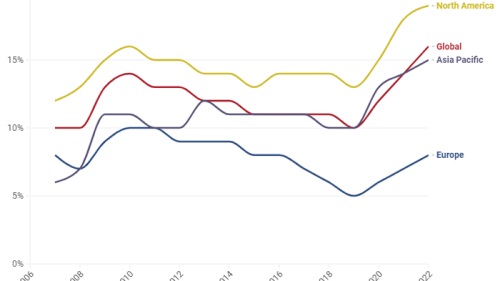An increasing number of men in the industry are determined to play a more active role in elevating women in the commercial real estate workplace. As ULI’s Women’s Leadership Initiative (WLI) celebrates its 10th anniversary, five male industry leaders and seasoned real estate executives talk about why the topic is so important to them.
John Walsh, chief executive officer of TIG Real Estate Services, has been in the industry for more than 45 years and has long advocated for women leaders in his company and at ULI. About half of his company’s employees are women. “We’re not trying to fill some number,” he says. “We’re trying to hire the best people, and when you hire the best people, you’re going to be diverse.” Walsh is a member of the WLI Executive Committee and encourages women to get involved in the Institute.
He recently convinced a colleague he met through ULI Dallas/Fort Worth, Gianna Pigford, a principal architect at Stantec, to join the first cohort of the WLI Circles program. She subsequently was invited to serve on the national WLI Executive Committee.
Walsh credits his devotion to the cause to his family. He admired his grandmother, who ran a successful small business despite the fact that she had little education.
Many women in the industry see the lack of a mentor as one of the three main hindrances to their advancement, according to a 2020 CREW Network benchmark survey. Only 56 percent of those surveyed have had a mentor in the past couple of years, and only 21 percent of women of color have had a mentor.
Making Intentional Strides
Like Walsh, J.F. Finn, principal at Gensler (a ULI corporate partner) and a member of the WLI Executive Committee, says he learned to respect the power of women growing up in a household in which his mother was equal partners with his father. Now father of four daughters, he’s grateful to work at a firm where women leaders are celebrated on all levels: Diane Hoskins is Gensler’s co-CEO. Finn says it is imperative that intentional strides be made to include and promote women in the industry.
“My background that I had growing up and then being in a leadership position at Gensler and recognizing that we cannot be passive in recognizing, advocating, and promoting potential strong women leaders—it just didn’t happen because people were good people or because people had a good attitude in a culture,” he says. “Rather, there were a lot of professionals in our industry that were being left behind. What I saw at Gensler, there are a lot of incredible professionals that were starting to get the opportunities that their male counterparts would get, and that became something that we in the firm started overtly talking a lot about. We were good but could do better.”
Finn says men who work at Gensler began to seek forums where they could advocate for women on a broader level, including outside the firm.
That same CREW benchmark study also revealed that only 9 percent of the C-suite positions in commercial real estate were occupied by women in 2020. That compares unfavorably with other industries, according to a recent ADP study, which showed that women accounted for 29 percent of corner-office positions.
“The industry struggles with the pipeline,” Finn says. “That’s the biggest challenge. The pipeline is still structurally set up to be able to advocate and advance the people you hung out with, the people you knew in college, and even now that still happens to be men advocating for men because that’s who leadership has exposure to. So again, WLI provides a vehicle to be active in our advocacy.”
While women make up half of the population nationwide, the number of women in commercial real estate has been low historically. Of 45,000 ULI members, more than 13,000 are women—29 percent of the total—up from about 20 percent a decade ago. Though for decades many women have been relegated to primarily working in human resources or marketing, Finn says it is a new day now.
“I think it’s changing rapidly,” he says. “There are a lot more opportunities and a lot more acceptance.”
Adam Weers, chief operating officer at Trammell Crow Company, agrees. His company is “absolutely” committed to diversity, equity, and inclusion, he says.
“Those commitments are promises,” says Weers, who is also on the ULI Americas Executive Committee and is a ULI global governing trustee. “A part of making good on those promises is being an advocate. I think this idea that we are talking about is important because this is how you make good on the promise of diversity, equity, and inclusion; this is how you make good on the promise of increasing the level of diversity at a firm at all levels. This is the promise in action.”
In addition to promotions, pay equity is another issue. While in some industries more women now hold higher-earning positions historically held by men, they still are not making as much money as men, according to CREW. This is also true in technology, where half of all men make more than women who hold the same position.
According to a recent Pew Research report, women nationwide only earn 84 percent of what men make. Experts say women who identify as ethnic minorities often face even bigger pay disparities.
Setting Standards
Forming alliances with women is a key component of Trammell Crow’s success, Weers says. One woman he supports is Davis Griffin, principal at Trammell Crow’s Houston office, whom he calls “one of the most talented leaders and professionals” at the company.
“She’s awesome,” Weers says. “She’s phenomenal at what she does, and having a leader like Davis Griffin in our organization makes us better, stronger, faster. We’re a better company with Davis Griffin here.”Griffin credits Weers with playing a role in a recent move she made that has benefited her career. Weers is an “all-star” who believes in the value of diversity “to his core,” she says. As an advocate, Weers is always seeking out opportunities for women.
Sally Riker, a partner at Lowe Engineers in Atlanta, says she “thinks the world of” Monte Wilson, vice president, Cities & Places global market executive–people and places solutions, at Jacobs in Atlanta, whom she knows through ULI. Abbey Roberson, vice president of planning at the Texas Medical Center in Houston, says Wilson encouraged her to join ULI. Wilson also jump-started her career when he gave her an internship while he was an executive at HOK and she was a graduate student at Georgia Tech.
From Wilson’s point of view, having multiple perspectives in the workplace is advantageous. He has always believed “we’re better together” and that greater inclusivity and diversity have made the industry stronger. “Knowing that I’ve perhaps played a role promoting and providing talented people with opportunity and continuing to support them in their career through a nudge, push, support, or whatever is required, you gain a sense of pride in watching them flourish,” he says.
Wilson says it is natural for him to be supportive of women because of his successful wife, Jill, and the fact he benefited from female mentors. He points to an early mentor, Barbara Price, a senior leader at HOK, as one example. As his career has progressed, Wilson says he has worked collaboratively with women in an “organic way” that has “evolved over the years.”
Edward Henley, principal and project executive at Nashville-based Pillars Development, says his career has also been fueled by strong women, particularly those who shaped him when he was growing up. “So I know the value that a woman brings to any situation, and that really just encouraged me to increase the diversity in the field, especially in the ways that I could,” Henley says.
He founded Pillars Development when he was 24. One of the aspects of ULI he loves the most is WLI, he says, and the majority of his team consists of women. “We have intentionality in that,” Henley explains. “We see women as valuable. I think it’s very important there’s intention in blazing the trail and feeding the soil for the growth of women in our industry.”
Karen Jordan is a Los Angeles-based business journalist.






